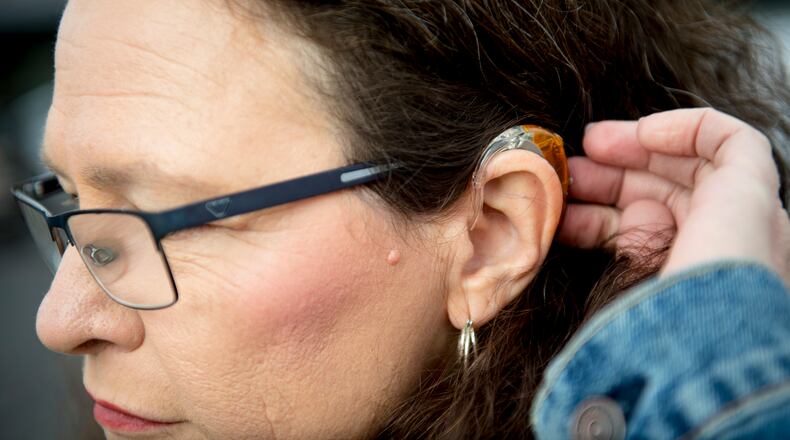Local doctors said they are hopeful that this will help provide access to those dealing with mild to moderate hearing loss. They added individuals should still work with their health care providers if they have more severe hearing loss and/or possible signs of an ear infection, the latter of which could impact an individual’s hearing.
“I think in general its going to be a really great thing for a lot of patients,” said Dr. Laura Tully, who is board certified in otolaryngology and a doctor with Premier ENT (ear, nose, and throat) Associates.
Currently, the average cost for a pair hearing aids can range from $2,000 to $7,000, according to GoodRx. For those suffering from mild to moderate hearing loss, they may not want to spend the money out of pocket if they lack the coverage for those aids. According to the Centers for Medicare and Medicaid Services, there is is no provision in Medicare law to pay audiologists for therapy services such as auditory rehabilitation or hearing aids and auditory implants.
“Most insurances do not cover hearing aids,” said Tully. She added undergoing hearing tests for the purpose of that hearing test are also generally not covered, but they can be covered if the hearing test is part of a medical evaluation by an ENT doctor.
For those with mild to moderate hearing loss, OTC hearing aids give them the opportunity to be aided and protect their hearing at a more affordable cost.
“We’re encourage patients to get hearing aids sooner,” Tully said.
The downside is people may believe they only have mild to moderate hearing loss, but it could be worse.
“You don’t have to get a test that tells you that you have mild to moderate hearing loss,” Tully said. “Patients often have a hard time gauging how much hearing loss they have … Without that confirmation of a hearing test, patients are really left guessing where they’re at.”
Tully noted there are also currently amplifiers on the market, which are different than hearing aids.
“The amplifiers are not part of this FDA approval,” Tully said, noting amplifiers are meant for individuals with normal hearing level. “They are just considered an electronic device.”
Dr. Carlos Ventura of Kettering Health Years Ahead Primary Care said there have been OTC hearing aids on the market before, but this new classification makes it official. He also encouraged individuals with hearing issues to still seek out medical advice when it comes to hearing aids.
“Everyone has a different baseline problem,” said Ventura, who is a fellowship-trained geriatrician, specializing in managing chronic medical conditions with an emphasis on elder care.
Those with hearing issues could be dealing with varying issues of high or low pitch, or also high or low tone.
“You cannot really know that without proper evaluation,” Ventura said.
Senior adults have also had “so much exposure to noise,” Ventura said, so those individuals tend to have more complex cases of hearing loss. He said doctors can help individuals find technology targeted to their specific issues.
“For senior adults, its always best to touch base with your primary (care provider),” Ventura said.
Doctors also encourage individuals with hearing issues to seek out medical advice if they are also dealing with symptoms of an ear infection or ear disease. Tully said red flags include if the ears feel clogged, if you feel like you are under water, and/or if there is any drainage, pain, or itching, then individuals should seek out medical care. The addition of a hearing aid can make a potential ear infection worse.
What are the signs and symptoms of hearing loss?
According to the FDA, you may have a hearing loss if:
- People say you are shouting when you talk to them;
- You need the TV or radio turned up louder than other people;
- You often ask people to repeat themselves because you can’t hear or understand them, especially in groups or when there is background noise;
- You can hear better out of one ear than the other;
- You have to strain to hear;
- You can’t hear a dripping faucet or a high pitched note of a violin; and/or,
- You think people “mumble” when they speak.
If you have any of these signs and symptoms, health experts say you should consider seeing your doctor or hearing healthcare professional to be tested for hearing loss.
About the Author

